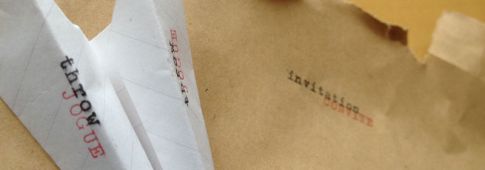From street art to street games, Bristol is the world’s very first Playable City, known for its playful approach to public spaces, and for its drive to get residents and visitors engaged with the city and its creative and cultural future, demonstrated by successful projects like Hello Lamp Post. Now, in partnership with the British Council and Brazilian technology park Porto Digital, Watershed is reaching out and taking this idea to Brazil – to Recife, in a bid to transform Recife into the world’s second Playable City.

Early next year, Recife: The Playable City will enable a talented group of artists, producers and creative technologists to participate in a creative lab spanning Bristol and Recife. This group will together develop new ideas that use art and technology to engage and inspire audiences, demonstrating how playful ideas can empower citizens and tackle the challenges our future cities face.
Victoria Tillotson from Watershed says,
“I’m incredibly excited about the potential of Recife: The Playable City. At a time where cities across the world are becoming increasingly ‘smarter’, there is a real opportunity to explore how playful ideas that combine technology and culture, can empower citizens, whilst effectively addressing the challenges our cities face. Watershed is delighted to work with Porto Digital and the British Council on this programme, and I can’t wait to see what these amazing practitioners create.”
The selected participants are:
Leo Falcão is creative director of the Scriptoscope, a content design research and creation group. His work spans film, theatre, literature, TV, and games.
George Lovett is an architect exploring relational and social art practice with the public and in shared places.
Fábio Florencio is a games designer. He currently works at C.E.S.A.R, owns a freelance sound design outsourcing company and is a Master Degree student.
Rosie Poebright is founder and lead designer at Splash & Ripple: “Architects of Extraordinary Adventures”, whose work includes citywide theatrical street games and installed adventures in castles and museums.
HD Mabuse develops projects focused on collaboration, emergent behaviours, and the remix of visual arts, design and music. He is also currently a design consultant at C.E.S.A.R.
Laura Kriefman is a choreographer, creative technologist and Fellow of the Clore Cultural Leadership Programme.
Filipe Calegario is a doctorate student in computing at UFPE’s Computer Lab Centre and develops projects that bring together computing, music and visual arts. He is interested in finding new ways of interacting with the computer, demystifying technology, thus showing that the world is a platform that can be hacked by anybody.
Helder Aragão de Melo is an animator, script writer, TV director, musician and DJ. He was integral to the development of Recife’s Manguebeat scene and interested in what he believes to be an inseparable combination, art and technology.
Eduardo Araujo Oliveira is a systems engineer for C.E.S.A.R, experienced in the area of Smart Cities and Artificial Intelligence. He holds a Master and Doctorate in Computer Science and is also a teacher of Digital Games.
Tine Bech is an artist and researcher working with interactive sculpture and public art, which aims to create experiences of immersion and play.
Camila Bandeira is co-founder and director of Proa, a company specialised in cultural marketing. She is a qualified Business Manager and has over 10 years experience of producing events and cultural projects in both Brazil and California (USA).
Isabelle Croissant is Creative Industries Programme Manager at Cornerhouse in Manchester, programming and delivering the organisation’s Creative and Digital Programme.
Thaís Vidal was born in Recife and is the youngest of our producers at 22 years old. She has degree in journalism and has worked as a cultural producer of cinema and music since 2010.
Katherine Jewkes is Digital Associate at National Theatre Wales, where she helps people to playfully integrate digital technology into their creative practice.
Andrew Sleigh is Creative Producer at Lighthouse, where he is developing the interdisciplinary studio programme, launching in Spring 2014.
Germana Uchôa is a creative entrepreneur and consultant for the Fashion and Design Market.
Daniel de Hora has been Associate Creative Director of DH,LO Creative Boutique since 2010, and is considered one of the most important Brazilian creatives of his generation, appointed one of the “Ten most influential creatives in Brazil” by AdvertLatina.
Philip Tew, who is a curious blend of programmer and digital artist.
David Haylock is a Creative Technologist at Watershed and all round technology enthusiast and advocate.
This brand new initiative is part of the British Council’s Transform programme and is supported by Arts Council England.
A host of associate organisations in the UK and Pernambuco are also helping with delivery of the programme, these include: Lighthouse, Cornerhouse, Site Gallery and National Theatre Wales (UK), the Secretary of Economic Development, UFPE (Pernambuco’s Federal University), the Gilberto Freyre Foundation, Recife’s City Council, Delta ZERO, Fundaj, and CESAR (Recife Centre for Advanced Studies and Systems) (BR). These industry experts will participate in the programme, mentoring in the development of ideas and potential routes to market.
Pablo Rossello from the British Council, says:
“We’re delighted to be working with both Watershed, Britain’s first media centre and a champion of independent digital media creativity, and Recife’s Porto Digital, Brazil’s most successful digital cluster. We’re sure the project will initiate interesting collaborations between the two countries, as well as raising awareness of culture’s role in driving sustainable urban change and business innovation. A large part of our work at the British Council’s Creative Economy team revolves around promoting international dialogue and research around digital technology’s impact on culture, showcasing what the UK has achieved so far in this area, and raising awareness of the wider social and business applications of the ideas generated at this intersection.”
Francisco Saboya of Porto Digital says:
“Finally, cities will be looked at in a new light. Engineers, architects, planners, economists and politicians have visions of our 21st century cities, which are often focused on and limited by surveillance, efficiency and order. Cities that rock are playable cities that enable meaningful experiences, interaction and serendipity. So we welcome artists, technologists and creative people from Recife and Bristol to bring new ideas to our cities, and reinvent this brilliant space. Porto Digital believes in the transforming power of innovation and therefore bets on this project. Let’s play the cities!”
Learn more about the participants here: www.watershed.co.uk/playablecity/recife/participants
